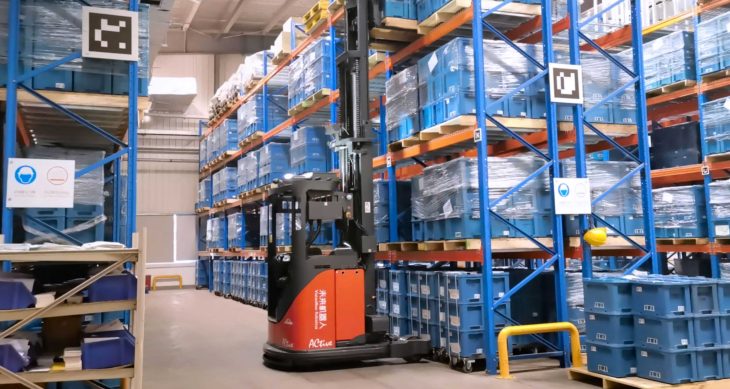Industrial robotics has in recent years become one of the hottest tech sectors in China as the country encourages the use of advanced technology to enhance efficiency on the production floor.
VisionNav Robotics, which specializes in autonomous forklifts, stacking vehicles and other logistics robots, is the latest industrial robot maker from China to get funded. The Shenzhen-based automated guided vehicle (AGV) startup has snagged 500 million yuan (around $76 million) from a Series C extension round led by Meituan, China’s food delivery giant, and 5Y Capital, a prominent venture capital firm in the country. Its existing investors IDG, TikTok’s parent firm ByteDance, and Xiaomi founder Lei Jun’s Shunwei Capital also joined in the round.
Founded in 2016 by a group of PhDs from the University of Tokyo and the Chinese University of Hong Kong, VisionNav’s valuation was boosted to over $500 million in this round, up from $393 million just six months ago when it picked up 300 million yuan ($47 million) in a Series C financing, it told TechCrunch.
The new funding will allow VisionNav to invest in R&D and broaden its use cases, expanding from a focus on horizontal and vertical moving to other functions like stacking and loading.
The key piece in adding new categories is to train and improve the startup’s software algorithms, less so developing new hardware, said the firm’s vice president of global sales, Don Dong. “From controlling, dispatching, to sensing, we will have to improve our software capabilities as a whole.”
A major challenge for robots, said Dong, is to effectively perceive and navigate the world around them. The problem with a camera-powered autonomous driving solution, like that of Tesla, is it can be easily affected by bright light. Lidar, a sensing technology heralded for its more accurate distance detection, was still too expensive for mass adoption a few years ago, but it has seen its price slashed substantially by Chinese players like DJI-affiliated Livox and RoboSense.
“Before, we were mostly providing indoor solutions. Now that we are expanding to unmanned truck loading, which is often semi-outdoors, it’s inevitable we will be operating in strong light. That’s why we are adapting a combination of vision and radar technologies to navigate our robots,” said Dong.
VisionNav sees Pittsburg-based Seegrid and France-based Balyo as its international rivals but believed it has a “price advantage” for being in China, which houses its manufacturing and R&D activities. The startup is already dispatching robots to clients in Southeast Asia, East Asia, as well as the Netherlands, the U.K. and Hungary. It’s in the process of setting up subsidiaries in Europe and the U.S.
The startup works with system integrators to sell its robots, meaning it doesn’t collect detailed customer information, making data compliance in foreign markets simpler. It’s expected to derive 50-60% of its revenues abroad in the next few years, compared with the current share of 30-40%. The U.S. is one of its main target markets, said Dong, as the forklift industry there generates “greater gross revenues than that of China despite having a smaller number of forklift vehicles.”
Last year, VisionNav pulled in total sales revenues between 200 million ($31 million) and 250 million yuan ($39 million). It currently operates a team of around 400 people across China and it’s expected to reach 1,000 staff this year by hiring aggressively overseas.
